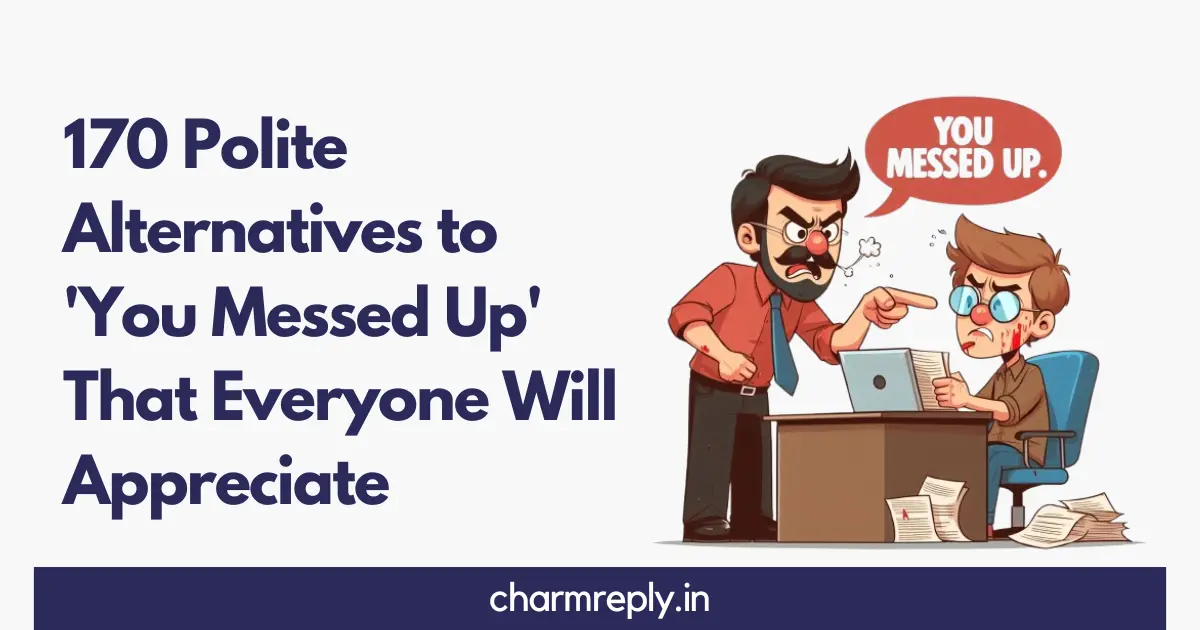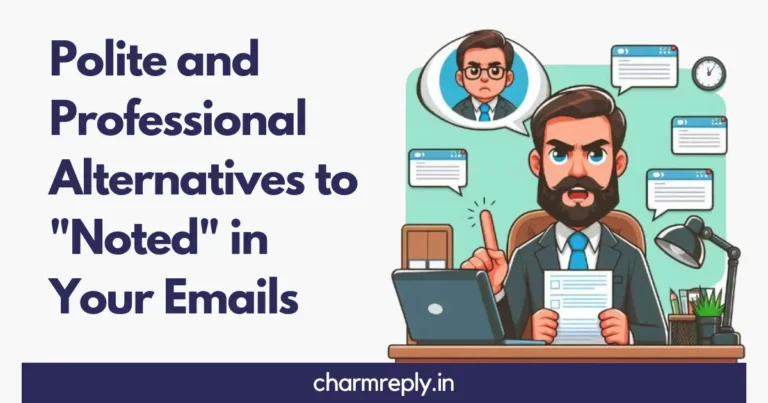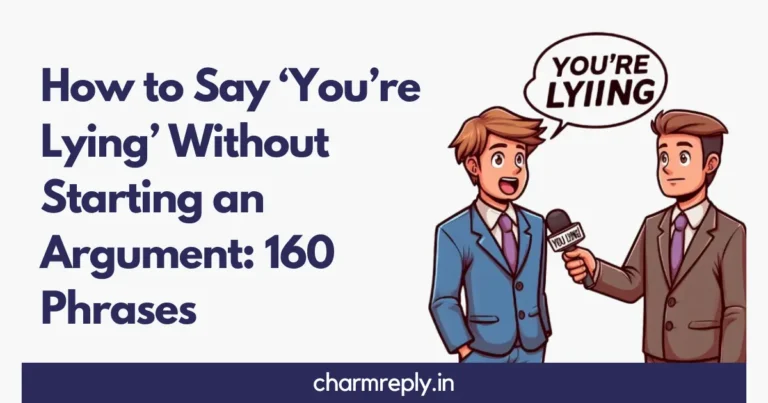170 Polite Alternatives to ‘You Messed Up’ That Everyone Will Appreciate

Imagine you’re in a meeting, and your colleague has just presented their work. You notice a small mistake, but you don’t want to make them feel bad. How do you bring it up without saying, “You messed up,” and sounding too harsh? This is a situation many of us find ourselves in – figuring out how to offer feedback kindly.
Here Are 170 Ways to Say ‘You Messed Up’ Without Sounding Harsh
In this article, we’ll show you how to point out mistakes without using phrases like “You messed up.” These gentle ways of giving feedback will help you communicate clearly and respectfully. Whether it’s with a co-worker, a friend, or a family member, these tips will help keep your conversation positive.
Mistakes happen to everyone, but that doesn’t mean they should be ignored. Let’s examine some simple ways to address them with understanding and care.
Polite Alternatives for Workplace Settings
- It looks like there’s room for improvement here.
- Let’s review this again to ensure everything is on track.
- There’s an opportunity to refine this further.
- This could use a little adjustment.
- Let’s take another look at this.
- I see a few areas we can improve on.
- We can make some tweaks here to get it right.
- I think we can adjust this for a better outcome.
- Let’s revisit this and make sure everything aligns.
- This isn’t quite what we expected, but we can correct it.
- I noticed an area where we could make some improvements.
- It looks like we encountered a small hiccup here.
- Let’s work together to fix this.
- We’ve got a few things to adjust, but we’ll get there.
- There’s a small oversight that we can address.
- This might need a little reworking to fit the plan.
- We’ve made some progress, but let’s fine-tune a few details.
- There’s an opportunity to revisit this and make some changes.
- I think a few modifications will help us get back on track.
- This could be improved with some small adjustments.
- I see where we might have missed a step here.
- We need to go back and tweak this for accuracy.
- This is a good starting point, but it needs a bit more work.
- There’s a little more refining to do here.
- We’re almost there; just a few more adjustments needed.
- I think this could use a bit more clarity.
- It seems like we’ve made an error here; let’s fix it.
- We’ve missed a small detail; let’s correct it.
- I think a slight adjustment will bring this back on track.
- This part can be improved with a few changes.
- It’s close, but a few tweaks will make it perfect.
- We can address this issue with a quick adjustment.
- Let’s make a few modifications to ensure accuracy.
- There’s an opportunity here to optimize this.
Polite Alternatives for Personal Conversations
- There’s a little room for improvement here.
- We can work together to fix this.
- I noticed something we might want to adjust.
- It looks like this didn’t go quite right, but we can make it better.
- I think we can fine-tune this a bit more.
- Let’s revisit this and see where we can improve.
- We can make some small changes to get it back on track.
- I think we could approach this in a different way next time.
- This didn’t go as planned, but let’s work through it together.
- I see where we went wrong — let’s fix it.
- We’ve got a bit of work to do here, but we’ll get there.
- I think we missed a step, but we can fix it.
- Let’s make a few adjustments to improve this.
- We’ve learned from this and can move forward stronger.
- It looks like we’ve hit a small bump, but it’s nothing we can’t fix.
- I noticed a few things that we could change for the better.
- Let’s take a moment to reassess and find a better approach.
- This is a good start, but a few tweaks will make it better.
- Let’s see if we can find a way to improve this next time.
- I think a little adjustment will make a big difference here.
- I can see where things went off-track, let’s fix it.
- I know this wasn’t the outcome we were looking for, but we can learn from it.
- This can be an opportunity to learn and improve for next time.
- It looks like we missed a detail, but we’ll catch it.
- We’ve got this; a few small changes will make all the difference.
- I think we can adjust this and make it work.
- Let’s take another look at this and see how we can improve it.
Using Empathy in Communication
- I can see how that happened — let’s work through it together.
- I understand how this might have been frustrating for you.
- It seems like things didn’t go as planned, but that’s okay.
- I know you were trying your best, let’s figure this out.
- We all make mistakes; let’s see how we can fix this together.
- I get that this didn’t turn out the way we expected.
- I can imagine how that might have been tough.
- I see what you were trying to do, let’s make it right.
- Let’s not worry about it — we’ll get back on track.
- I know this wasn’t what you were hoping for, but we can work through it.
- It’s okay, we can sort this out and move forward.
- I understand that this might be disappointing, but we’ll fix it.
- I know you put a lot of effort into this, let’s adjust it together.
- I appreciate your hard work here, let’s see how we can improve this.
- I can understand how this might have happened, let’s figure it out.
- I see you’ve put thought into this, and we can tweak it a little.
- I understand this wasn’t the result you were expecting, but we’ll get it right.
- I can tell you’ve been working hard, let’s make some changes to improve it.
- We’ve all been there, let’s take another look and improve it.
- I know you were trying to get it right, let’s make the adjustments together.
- It’s okay, mistakes are part of the learning process.
- I see where things went off-track, but it’s not a big deal. Let’s fix it.
- I get that this might feel frustrating, but we can correct it easily.
- It’s alright, we’ll work through it and come out stronger.
- I understand how this could have happened, and we’ll take care of it.
- I see how that could be confusing, let’s clarify things.
- I know this was a challenge, but we’ll get it sorted.
- I can tell you’re working hard, let’s just make a few tweaks.
- It’s okay to make mistakes; we’ll use this as a learning experience.
- I know you did your best, let’s just adjust this a bit.
- It looks like we missed a step, but that’s okay — let’s fix it.
- I understand this might feel like a setback, but we’ll get through it.
- I know this wasn’t the result you wanted, but we can easily adjust.
- It happens! Let’s just go back and see where we can improve.
- I see where the confusion came from — let’s clear that up together.
- It’s alright, we can fix this. Let’s work through it and make it right.
Creative Ways to Address Mistakes Politely
- It looks like we missed the mark here, but it’s fixable.
- I think we’re almost there; a few tweaks will make this right.
- This didn’t go as expected, but it’s nothing we can’t improve.
- It seems like we hit a little bump, let’s sort it out.
- This needs a bit more polishing, but we can get it there.
- I can see where this went off track, but we can adjust it.
- We’ve got a slight detour here; let’s get back on course.
- I think there’s a better approach we can take with this.
- This could use a bit of fine-tuning, but we’ll get it right.
- Let’s revisit this and make sure we’re on the right path.
- This didn’t quite turn out as planned, but we can improve it.
- We’ve encountered a small setback, but it’s manageable.
- This part needs a little more work, but we’re close.
- Let’s see if we can adjust this to meet the goal.
- This is almost there, but we need a few adjustments.
- I see where we went wrong; let’s fix it together.
- This might need a little more clarity to get it right.
- We can definitely improve on this, let’s work on it.
- A few minor changes, and we’ll have it perfect.
- This could benefit from a slight adjustment, but we’re getting closer.
- I think we can sharpen this up a bit for a better result.
- Let’s go over this again to ensure it’s in the right direction.
- This isn’t quite what we envisioned, but it’s fixable.
- There’s room for improvement, and we’ll nail it next time.
- I think we missed a step, but it’s an easy fix.
- This needs a little realignment, but we’re on the right track.
- We’ve got a small issue here, but we can quickly resolve it.
- This part needs reworking, but we’ll get it right.
- It’s close, but a few changes will make it perfect.
- I think we could approach this differently to make it work.
- It’s a little off, but we’ll get it back on track.
- We’ve made some progress, but let’s refine this further.
- There’s a better way to handle this, let’s try it together.
- I can see where we went wrong here, but let’s fix it now.
- This can be easily adjusted — let’s get it to the right place.
Group Project Responses
- It looks like there’s been a misunderstanding, let’s review it together.
- I think we missed a step here, but we can fix it.
- This didn’t go as expected, but let’s adjust it together.
- We’ve hit a small bump, but it’s easily fixable.
- I see where things went off track, let’s correct it.
- It seems like there was a small mistake here, but we can get it right.
- Let’s take a moment to revisit this and make the necessary adjustments.
- We might need to tweak this a little, but it’s nothing serious.
- There’s a small issue here, but it’s nothing we can’t fix.
- Let’s look at this again and figure out where things went wrong.
- We can definitely make some improvements here.
- It’s alright, let’s work together to make this better.
- I think we could benefit from reviewing this together.
- It’s not a big deal, but let’s address this and get it right.
- I see where we can make adjustments, let’s fix it.
- This isn’t what we planned, but it’s an easy fix.
- Let’s take another look and correct this step.
- This part needs a little more work, but we’re close.
- I can see where the confusion happened, let’s clarify it.
- We’re almost there, just need to tweak this a bit.
- It’s okay, we can easily resolve this together.
- Let’s go over it one more time and adjust accordingly.
- I understand this didn’t go as planned, but we can work through it.
- We’ve made great progress, now let’s smooth out the details.
- I know this wasn’t the intended outcome, but we can fix it quickly.
- This can be corrected easily, let’s address it.
- Let’s take a moment to adjust things and get it right.
- I see what went wrong, let’s work together to fix it.
- We’ve got a minor issue here, but we’ll sort it out.
- This didn’t turn out as expected, but we can learn from it.
- I know this wasn’t the best result, but it’s easy to correct.
- Let’s figure out what went wrong and make sure it’s right moving forward.
- I can tell where things went off-track, but we can realign it.
- Let’s make a few adjustments and get it back on course.
- This part needs reworking, but we’ll get it perfect.
- We’re on the right track, just need to fix this one area.
- Let’s make sure we address this mistake and keep moving forward together.
Final Thoughts
The way we address mistakes says a lot about our communication skills and emotional intelligence. By choosing words that are polite, constructive, and empathetic, we can help others learn from their mistakes without damaging relationships. Remember, mistakes are part of being human, and how we address them can lead to growth, understanding,






